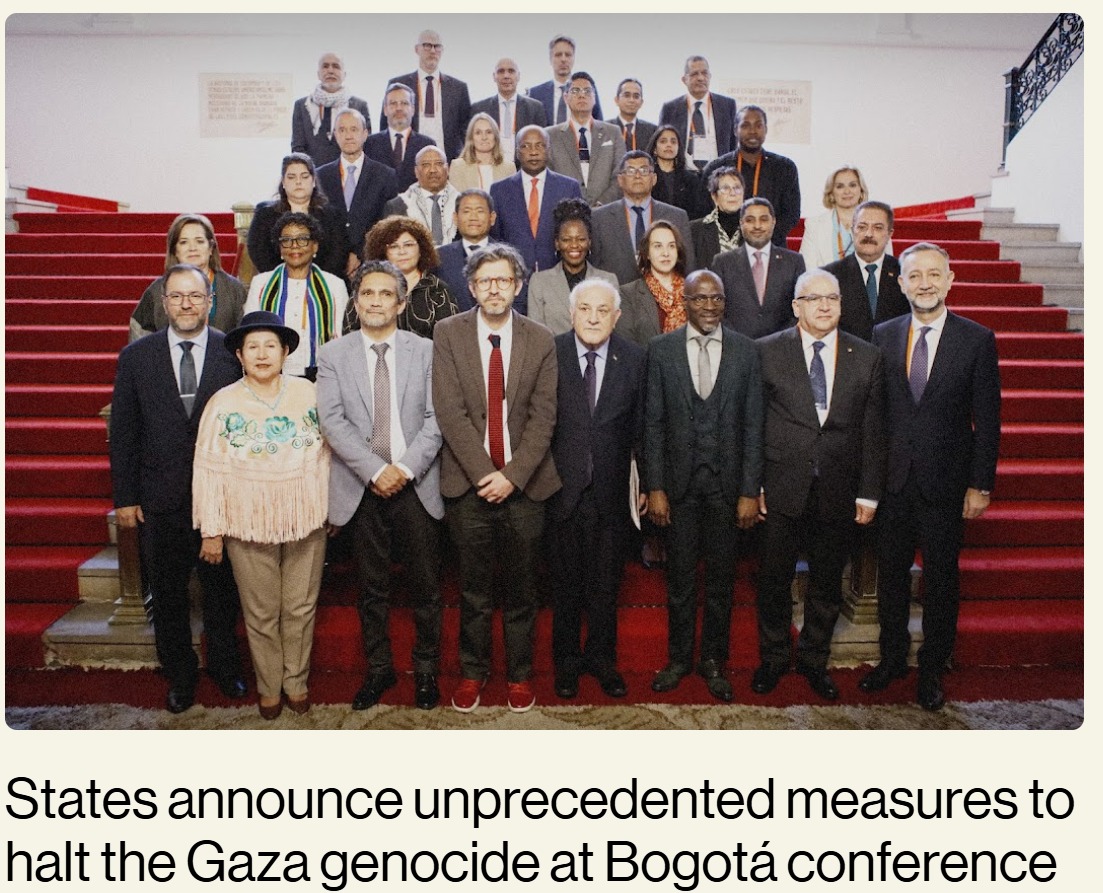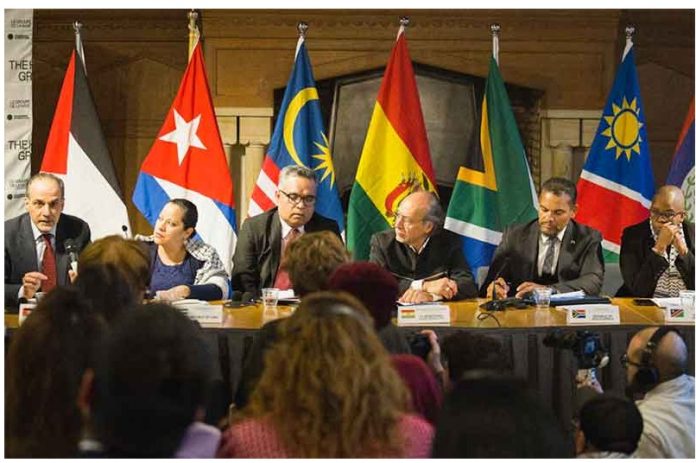– Mohammed Talha Siddi Bapa
In what many are calling a watershed moment in the international pursuit of justice, the Bogotá Summit (July 15-16) brought together over 30 nations in a bold bid to move from condemnation to coordinated action against what they described as Israel’s ongoing genocide in Gaza.
 Convened in Colombia’s capital and co-hosted by South Africa, the Emergency Ministerial Conference of the Hague International Coalition marks the latest and most decisive step by the Global South to enforce international humanitarian and legal norms, in defiance of geopolitical inertia and Western impunity.
Convened in Colombia’s capital and co-hosted by South Africa, the Emergency Ministerial Conference of the Hague International Coalition marks the latest and most decisive step by the Global South to enforce international humanitarian and legal norms, in defiance of geopolitical inertia and Western impunity.
A Turning Point in Global Legal Conscience
“The world cannot remain passive while war crimes are live-streamed,” declared Colombian President Gustavo Petro, who opened the summit with a call to replace “the hypocrisy of power politics” with “the courage of legal accountability.”
The summit builds upon the International Court of Justice (ICJ) advisory opinion of July 2024, which declared Israel’s occupation of Palestinian territories illegal, affirming that no state’s security justifications can override the prohibition of territorial acquisition by force.
In her address to the summit, Francesca Albanese, UN Special Rapporteur on the Occupied Palestinian Territories, praised the gathering as “the most significant political development” since October 2023. “We are no longer talking about a distant conflict. We are witnessing genocide. The law is clear, and states now have the duty to act,” she said.
Six Concrete Measures Against Impunity
Twelve countries – including South Africa, Colombia, Malaysia, Indonesia, Nicaragua, Libya, Bolivia, Iraq, Namibia, Cuba, Oman, and Saint Vincent & the Grenadines – committed to the following six legal and diplomatic actions:
- Arms Embargo: Immediate prohibition of weapons, ammunition, and dual-use technology transfers to Israel.
- Port Denial Measures: Barring Israeli or allied vessels carrying war-related cargo from accessing national ports.
- Flag State Enforcement: Revoking flags from any vessel suspected of transporting arms to Israel.
- Public Contracts Scrutiny: Terminating or reviewing government contracts with companies complicit in the occupation.
- Domestic Prosecutions: Enabling investigations and prosecutions under universal jurisdiction for war crimes.
- Support for the ICC: Coordinating evidence and legal pathways for international prosecutions at the International Criminal Court.
These measures are in line with both UN Charter obligations and precedents from past global justice efforts, such as the anti-apartheid movement and arms embargoes during the Balkan wars.
A joint communiqué from the summit states:
“Justice delayed has become complicity. Our legal frameworks are only as strong as our political will to enforce them.”
September Deadline for Global Consensus
The summit set a deadline of September 20, 2025 – ahead of the 80th UN General Assembly – for other nations to adopt or announce concrete steps toward ending complicity in war crimes. Several other nations, including Ireland, Algeria, Spain, Turkey, and Qatar, expressed interest or support for the Hague Group’s roadmap, though they have yet to formally commit.
Observers note that the Hague Group’s approach is built not just on rhetoric but enforceable mechanisms. “It’s a paradigm shift,” said Dr. Zubeda Musa, legal scholar at the University of Cape Town. “Instead of waiting for the Security Council’s greenlight – often vetoed by powerful nations – these countries are acting within their sovereign legal powers to uphold international law.”
The Global South’s Legal Revolt
The Bogotá Summit continues a trajectory begun earlier this year in The Hague, where the initial Hague International Coalition was formed in response to the ICJ’s preliminary findings. The coalition has grown from 6 to over 30 participating countries, reflecting what some are calling a legal revolt from the Global South.
According to Colombian Deputy Minister Mauricio Jaramillo,
“For decades, international law has been twisted by those who wield military and economic power. This summit reclaims the law as a tool of justice, not just rhetoric.”
Predictable Western Backlash
The United States has responded critically, accusing the coalition of “weaponising international law” and targeting democratic allies. A spokesperson for the US State Department claimed the summit would “further polarise an already complex situation,” but offered no legal rebuttal to the ICJ’s findings.
Rights organisations, however, welcomed the move. Amnesty International and Human Rights Watch called it “a long-overdue assertion of state responsibility,” while South Africa’s Centre for Applied Legal Studies hailed it as “a diplomatic echo of the anti-apartheid movement, this time with legal muscle.”
Voices from India and Beyond
While the Indian government has maintained silence on the Bogotá outcomes, civil society voices have lauded the initiative. Constitutional law expert Dr. Faizan Mustafa remarked:
“This is how international law should work. When the Security Council fails, moral nations must rise.”
India’s own past leadership in the Non-Aligned Movement and Palestine solidarity places it in a historically relevant position – one observer hopes New Delhi will reclaim as the global momentum shifts.
A Shift in Global Responsibility
As bombs continue to fall on Gaza and global institutions struggle to assert relevance, the Bogotá Summit offers more than symbolic resistance. It presents a legal framework backed by coordinated diplomacy and growing support across continents.
Whether the momentum will hold depends on how many more nations step forward before the September deadline. But one thing is clear: the world is no longer content to watch from the sidelines. From the streets of Bogotá, to the courtrooms of The Hague, to the rubble of Gaza, the call for justice is becoming harder to ignore.




